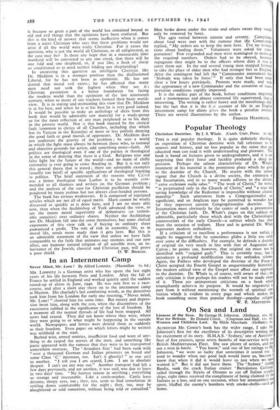Popular Theology
Tins is real popular theology. It is quite definitely theology. an exposition of Christian doctrine with full reference to a
sources and history, and no less popular in the sense that any educated man can read it with understanding and pleasure. The
book is based on lectures given to undergraduates, and it is not surprising that their force and lucidity produced a deep im- pression. Perhaps the salient characteristic of Dr. Whale's treatment of his material is the prominent place which he gives to the doctrine of the Church. He asserts with the utmost vigour that the Church is a divine society, the extension of the Incarnation, and in so many words adheres to the dictum, " extra ecclesiam nulla salts." " The work of Christ," he writes, " is perpetuated only in the Church of Christ," and " a true and saving knowledge of the Redeemer is impossible without church- manship." Such utterances from a Congregationalist are significant, and an Anglican may be permitted to wonder how far they represent current Congregationalist doctrine. The Incarnation must obviously be the centre of such a presentation of the Christian faith. Dr. Whale's pages on this subject are admirable, particularly those which deal with the Christological controversies of the early Church—a subject which has often been the occasion of tedium. Here and in general Dr. Whale, represents modern orthodoxy.
If a criticism of so excellent a performance is not unfair, it might be suggested that he sometimes glides a little too easily over some of the difficulties. For example, he defends a doctrine of original sin very much in line with that of Augustine and Calvin ; he points out, however, that original sin must not be identified with " original guilt." This is certainly true, but it introduces a profound modification into the orthodox scheme Again, the Fathers who developed the doctrine of the Form of Christ accepted the Fourth Gospel as unquestionably historical; the modem critical view of the Gospel must affect our approach to the doctrine. Dr. Whale is, of course, well aware of this ; the only criticism is that perhaps his readers will not be made aware of it. These are unimportant criticisms on a book which triumphantly achieves its purpose. It would be ungrateful to part from it without mentioning the warmth of spiritual con- viction which is evident in every page and which makes the book something more than popular theology—popular religion W. R. MATTHEWS.


























 Previous page
Previous page